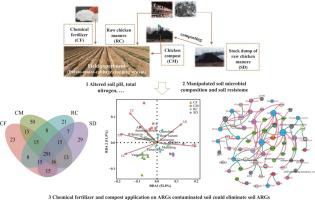Journal of Hazardous Materials ( IF 12.2 ) Pub Date : 2022-07-30 , DOI: 10.1016/j.jhazmat.2022.129704 Tingting Li 1 , Ruochen Li 1 , Yifan Cao 1 , Chengyuan Tao 1 , Xuhui Deng 1 , Yannan Ou 1 , Hongjun Liu 1 , Zongzhuan Shen 1 , Rong Li 1 , Qirong Shen 1

|
The effects of different fertilization on microbial communities and resistome in agricultural soils with a history of fresh manure application remains largely unclear. Here, soil antibiotic resistance genes (ARGs), mobile genetic elements (MGEs) and microbial communities were deciphered using metagenomics approach from a long-term field experiment with different fertilizer inputs. A total of 541 ARG subtypes were identified, with Multidrug, Macrolides-Lincosamides-Streptogramins (MLS), and Bacitracin resistance genes as the most universal ARG types. The abundance of ARGs detected in manure (2.52 ARGs/16 S rRNA) treated soils was higher than chemical fertilizer (2.42 ARGs/16 S rRNA) or compost (2.37 ARGs/16 S rRNA) amended soils. The higher abundance of MGEs and the enrichment of Proteobacteria were observed in manure treated soils than in chemical fertilizer or compost amended soils. Proteobacter and Actinobacter were recognized as the main potential hosts of ARGs revealed by network analysis. Further soil pH was identified as the key driver in determining the composition of both microbial community and resistome. The present study investigated the mechanisms driving the microbial community, MGEs and ARG profiles of long-term fertilized soils with ARGs contamination, and our findings could support strategies to manage the dissemination of soil ARGs.
中文翻译:

土壤抗生素的减少与通过长期施肥对土壤微生物组的操纵有关
不同施肥对具有施用新鲜肥料历史的农业土壤中微生物群落和抗性组的影响仍不清楚。在这里,使用宏基因组学方法从不同肥料投入的长期田间试验中破译了土壤抗生素抗性基因 (ARGs)、移动遗传元件 (MGEs) 和微生物群落。共鉴定出 541 个 ARG 亚型,其中多药、大环内酯类-林可酰胺类-链霉素 (MLS) 和杆菌肽耐药基因是最普遍的 ARG 类型。在粪肥(2.52 ARGs/16 S rRNA)处理的土壤中检测到的 ARGs 丰度高于化肥(2.42 ARGs/16 S rRNA)或堆肥(2.37 ARGs/16 S rRNA) 改良土壤。在粪肥处理的土壤中观察到 MGEs 的丰度和变形菌的富集比在化肥或堆肥改良的土壤中更高。通过网络分析,变形杆菌和放线菌被认为是 ARGs 的主要潜在宿主。进一步的土壤 pH 值被确定为决定微生物群落和抗性组组成的关键驱动因素。本研究调查了驱动受 ARGs 污染的长期施肥土壤的微生物群落、MGEs 和 ARGs 谱的机制,我们的研究结果可以支持管理土壤 ARGs 传播的策略。











































 京公网安备 11010802027423号
京公网安备 11010802027423号